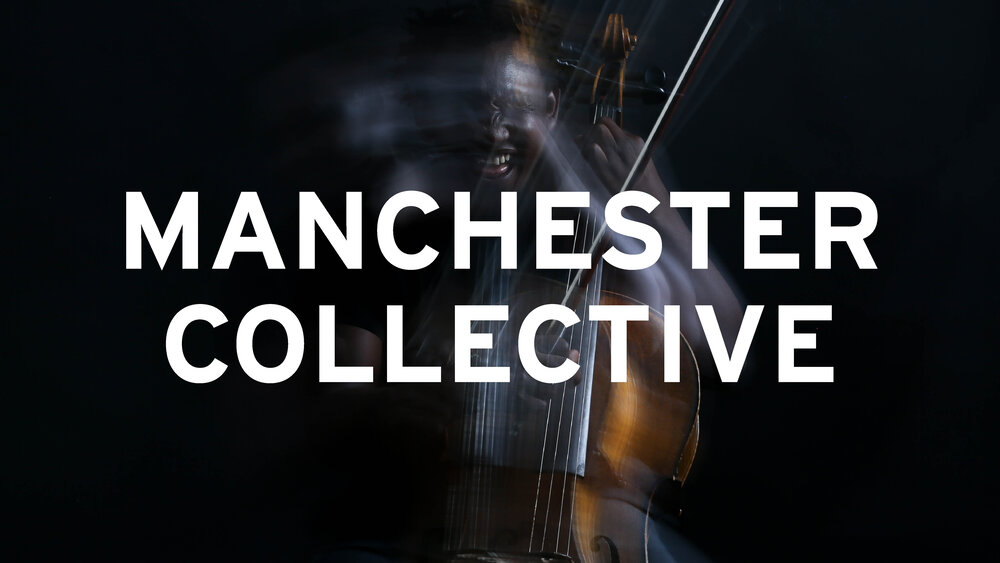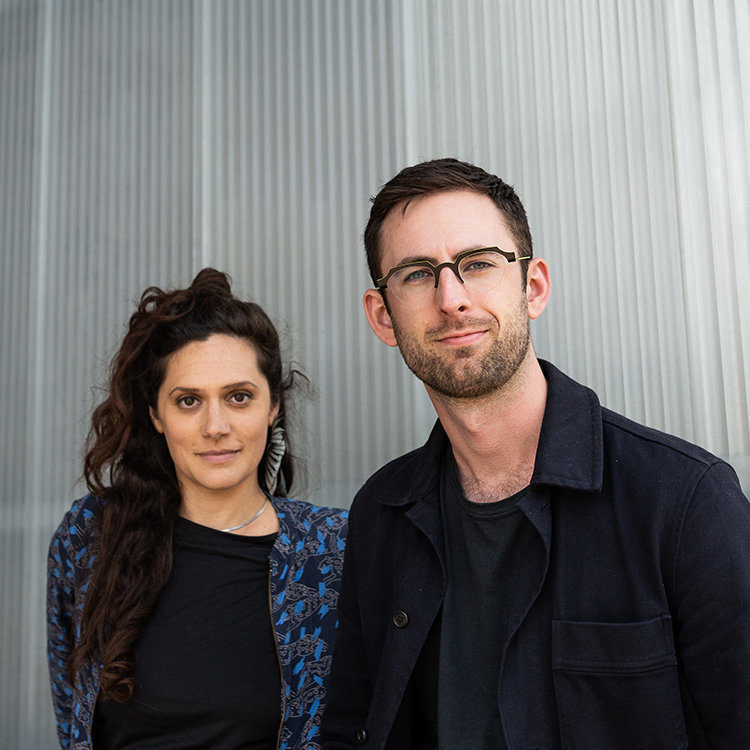Back to the ‘dome from home’ for another evening, and for what turned out to be one of the most thrilling Proms I’ve ever attended, for a whole host of reasons. Mainly, I think it was the sheer energy sustained throughout – the performers set out to electrify the audience, and succeeded.
Rewind to what we knew as we went in. This was the first appearance at the Proms of Manchester Collective. Represented mostly by their string players for this concert, they are in fact an innovative ensemble pursuing ‘projects’ as much as ‘programmes’, and their website reveals a thriving group of collaborators marrying composition, movement and visuals to develop and enhance their musical repertoire.

Tonight they were teaming up with Collective collaborator and harpsichord warrior Mahan Esfahani, whose instrument was to play a starring role in the proceedings. No doubt, if ‘Mahan Esfahani and the Manchester Collective’ had appeared on a gig poster a few decades ago, you might have imagined a loose-limbed prog outfit, not averse to stretching out into some epic soundscapes. I was delighted to find that, in some respects, that’s what we got.
Accessibility and outreach have long been key aims of the Proms – whether by mixing up genres in the programming, getting new music out there alongside the old indestructibles, finding connections with other artforms, or simply through the signature move of letting people buy cheap tickets to stand in the arena or gallery. The Manchester Collective musicians – perfectly at ease in offbeat venues – were perfectly placed to take advantage of the ‘gig’ atmosphere this generates.
Adam Szabo, their chief executive and a forthright, persuasive compère during the evening, described their excitement at playing the Royal Albert Hall as their first date after the Covid drought, balanced with their desire to make it feel as intimate a venue as possible. While they had drawn a handsome crowd, the arena’s ‘room to breathe’ and the chilled, attentive listeners (apart from some suitably riotous applause) encouraged almost a club vibe. In fact, in another, normal year, this would probably have been a late-night Prom. A strange positive, then, that circumstances gave Mahan and the Mancs a chance to take a prime-time slot by the scruff of the neck.
First impressions for most of us are, of course, visual – and the Collective seem to be walking a deliberately ambiguous line: are they an orchestra, or a group? Neither, and both. In a smart/casual attire of black with flashes of colour and pattern, they work without a conductor – musical director Rakhi Singh is leader in both the conventional sense, at the head of the violins, and of the whole in performance. Those musicians that can, stand up: in full flight, Singh’s rhythmic movement, almost an anchored dance at times, sends ripples through her colleagues and you can see, as well as hear, how they’ve become some kind of single, connected organism.
And that level of near-telepathic rapport is exactly what this music needs. Five works were programmed, the first an absolute hurricane of a piece: Górecki’s Harpsichord Concerto. I can only assume that opening with this one is a good idea because you don’t then have to tackle it later when you’re drained; but how you carry on afterwards is perhaps equally mystifying. Almost – almost – relentless for its ten-minute duration, the strings, heavier and heavier, seem to pile unending pressure onto to the soloist. Esfahani never buckles, though, playing with remarkable evenness at intense speed, almost reaching robotic levels – not because of lack of expression, far from it – but through sheer tirelessness. (I was intrigued to read that he is touring this piece with the Collective as part of a show called ‘Automata’.)
Esfahani then left the stage for a well-earned breather as the Collective played the rest of the first half in crack ensemble mode. Both works must have required huge levels of accuracy and discipline, but to such different effect. Edmund Finnis’s ‘The Centre is Everywhere’ is a delicate shape-shifter, like a musical presentation of a drifting in and out of consciousness, with some parts – at each end of the piece – so quiet that the instruments had to be amplified, so the players could make the closest sounds they could to silence. Their command of the audience was such that, had a pin dropped, we would have heard it over the music.

(photo from MC Bandcamp page, taken by Phil Sharp)
Time for another contrast, with Julius Eastman’s ‘The Holy Presence of Joan d’Arc’. As Szabo infomed (warned?) us, this piece perhaps owes as much to Led Zeppelin as Bach or Beethoven, in that it revolves around a chugging riff. Originally written for 10 cellos, this new arrangement allows the lower strings to major on the hook, with the rest firing off in all directions above it. The overall impression during the 20 minutes is one of resilience in the face of attacks from all sides – the rhythm laid down by the initial riff somehow makes it to the end of the piece, despite the twists, turns and variations, to invade the ‘top half’ of the sound. As an expression of resistance, it’s triumphant.
Sadly, Eastman was ultimately a tragic figure, dying at 50 in 1990. Apparently destined for greatness as a talented composer, pianist and singer, he was unable to conform with any kind of establishment and began the slide into oblivion. A black homosexual, he dropped explicit references to race and sexuality like depth charges in his work. Much of his music has been salvaged, rediscovered and even reconstructed after his death. Tonight’s piece – a kind of minimalist work in the sense that it single-mindedly takes a particular idea to extreme lengths – has made me eager to hear more.
More excitement followed the interval with Dobrinka Tabakova’s ‘Suite in Old Style, “The Court Jester Amareu”’. This is such a satisfying piece on so many levels. Packed with melody, it features a rousing fanfare so immediate you feel like it might have been around for centuries. As a solo showcase for viola, it has everything, from swirling, gypsy-folk style mayhem to plaintive, delicate exchanges. Soloist Ruth Gibson played with astonishing grace and verve, placing her viola firmly at the centre of the drama where it needed to be, carrying the group with her all the way. Esfahani gamely multi-tasked on harpsichord and a nifty tambourine.
Then it was Collective let-your-hair-down time. Drum kit and double bass arrived onstage to form a trio with Esfahani’s harpsichord for Joseph Horovitz’s ‘Jazz Harpsichord Concerto’. Perhaps the most astonishing aspect of this piece is that it works at all. The title might make it seem a gimmick, but any doubts evaporate once the music begins. Maybe Byrd and Bird aren’t so very different after all…! I wonder if it’s something to do with timbre: it struck me that the harpsichord might slot into the jazz idiom so well because it can sound a little reminiscent of both a keyboard and a guitar (sometimes simultaneously if one hand creates the melody while the other is vamping). And obviously, in Esfahani, you have a player who knows how to groove. But every piece of the jigsaw had to fit, and so plaudits to the other members of the “improved jazz trio”, Alan Taylor on drums and Misha Mullov-Abbado on bass, and the half-Nelson Riddle swoon and shimmy of the Collective themselves.
Szabo trailed an encore and we duly demanded it. Kilar’s tone poem ‘Orawa’ was a generous, spirited closer, echoing some of what had gone before – rhythmic drive, repeated hooks, extraordinarily tight playing – in a compact summary.
Leaving the Hall on a high, I reflected how confidently and impressively the Manchester Collective had made their mark on the festival. Tonight’s programme had been a perfect musical representation of their remit – almost a manifesto. They had managed to amplify the voices of living composers (two of them, Finnis and Tabakova, were in the audience), as well as those unsung and almost lost to us (Eastman), and made a strong argument for using contemporary music to instantly engage.
Esfahani is sometimes described as genre-busting in his campaign to keep the harpsichord and its repertoire current. But maybe the other way round works just as well. Hearing tonight how vibrant and natural the harpsichord sounds in so many different contexts suggests to me that barriers between styles, eras and genres are simply those we erect ourselves for no reason – resulting in the joy and surprise we felt as the Manchester Collective kicked them down.
AA
The featured photo for this piece is by César Vásquez Altamirano, as featured on the Manchester Collective website: https://manchestercollective.co.uk/
This Prom will be available to listen to on BBC Sounds until around the end of September: https://www.bbc.co.uk/sounds/play/m000ys34
Manchester Collective currently release their music on a refreshingly ‘indie’ basis, through Bandcamp. Head over there now to order their debut full-length record, ‘The Centre is Everywhere’ – its title track, of course, featured in this Prom. Limited edition vinyl copies can still be ordered at the time of writing – so don’t tarry. https://manchestercollective.bandcamp.com/album/the-centre-is-everywhere
Mahan Esfahani has recorded the Górecki Concerto on his superb album ‘Time Present and Time Past’ – widely available but here is a handy link to recommended retailer Presto: https://www.prestomusic.com/classical/products/8061300–mahan-esfahani-time-present-and-time-past